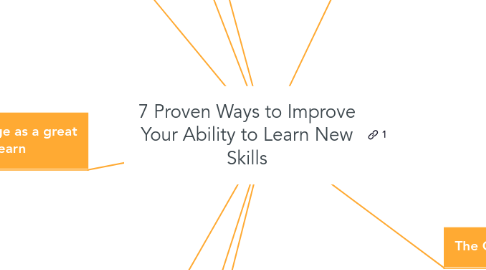7 Proven Ways to Improve Your Ability to Learn New Skills
by Danny Forest

1. Take action — Start learning a skill
1.1. Don't just read about how to get better at learning skills, apply it
1.2. Have an ongoing skill learning project to improve the skill of learning new skills
1.3. Try the 100 hour challenge
2. Breaking down a skill
2.1. The most effective way to become better at a complex skill is one sub-skill at a time.
2.2. Find the sub-skills that are most important and focus on improving them.
2.3. Improve a few sub-skills at a time, to not make the learning experience overwhelming.
2.4. To break down a skill, use the skill tree method
2.5. Always try to learn the most fundamental sub-skills first.
3. Always look for ways to improve
3.1. If you don’t search for what will make you better, you will never find it.
3.2. Search for and experiment with new ways of doing things
3.3. Put in effort and attention
3.4. Self-assess
3.5. Reflect on how each practice session went after it’s over and think of ways to improve it for next time.
4. View challenge as a great opportunity to learn
4.1. Anything that feels too easy, is probably things that you already know how to do, and you are not likely to learn much from it.
4.2. You should feel healthy stress (eustress)
4.2.1. It will push you to exceed your limits, do things that you didn’t think you could do, and expands your sphere of comfortable action.
4.2.2. This type of stress is helpful and a stimulus for growth.
4.3. Be willing to take risks, and put yourself in challenging situations
5. Find the optimal time of day to practice
5.1. Practice at a time of the day when you are rested enough to put your full focus towards the task you are learning.
5.2. Improving your skill requires that you are at the edge of your current abilities
5.2.1. When you are tired you are not able to push yourself to perform at this edge.
5.3. Practice when you are most alert
5.4. If you plan to practice more than once a day, separate the practice times with a longer break in the middle.
5.5. Eating and hydrating well and relaxing your mind by doing a different activity can be useful.
5.6. A good rest is very beneficial for learning
6. Create a learning environment that facilitates practice
6.1. A good learning environment makes it easy to start practicing your skill and contains few distractions.
6.2. Think of ways to prevent your phone, friends, or family from interfering with your practice.
6.3. Find a place to practice that is easy to reach.
7. Pay attention
7.1. Be fully focused on the task at hand and the feedback
7.2. Leave socializing and other distractions for before or after the practice.
7.3. Focus on the details that can make you improve at the skill you are learning.
8. Create your own optimised way of learning
8.1. There isn’t one ‘right’ way to learn anything.
8.2. Try experimenting and testing out a variation of ways.
8.3. It can be difficult to apply what world class performers are doing to your situation.
8.4. Look for inspiration on how to practice from those that are just a few steps ahead of you.
9. The Optimal Learner
9.1. 1. Is a master at deconstructing skills and can identify the most essential components of a skill.
9.2. 2. Takes action; you cannot learn a skill just by reading about it.
9.3. 3. Understands the principles of deliberate practice.
9.4. 4. Has a growth mindset (believes she can learn).
9.5. 5. Is good at objectively assessing their strengths and weaknesses.
9.6. 6. Is good at self-correcting (learning from mistakes).
9.7. 7. Has the ability to take in critical feedback.
9.8. 8. Is extremely focused during practice.
9.9. 9. Is excellent at deliberate recovery.
9.10. 10. Puts in a lot of effort.
9.11. 11. Focus on improving one thing at a time.
9.12. 12. Focus on the long run.
9.13. 13. Plans when and where they will practice.
9.14. 14. Prioritise and find time for practice.
9.15. 15. Creates an optimal practice environment.
9.16. 16. Takes responsibility for their learning, rather than making excuses.
9.17. 17. Always looks for ways to improve.
9.18. 18. Create their own optimised way of learning.


